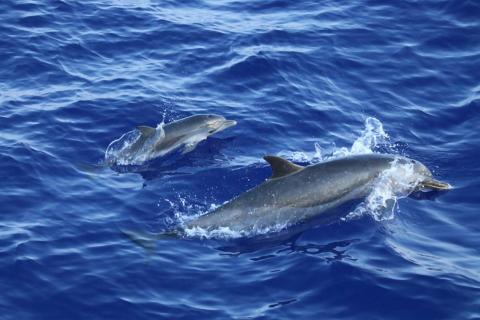The “Reducing Impacts to Cetaceans during Disasters by Improving Response Activities” (Marine Mammal Disaster Response) project kicked off in 2020. It focuses on restoring dolphins and whales and has taken significant early steps toward achieving its objectives. Originally approved in the 2019 Open Ocean Restoration Plan 2, the trustees have approved two minor changes to the project, initiated a data gap study to improve future responses to oil spills, and established the Disaster Response Working Group, which recently gathered for the first time.
Project Change Updates
The Disaster Response Coordinator is a key position to support improved marine mammal disaster response. Their on-site participation in response activities is needed to better identify response needs and inform future planning efforts, yet was not explicitly stated in the original plan. Therefore, the Open Ocean Trustee Implementation Group approved a project change to clarify the role of the Coordinator to actively participate in disaster responses, including evaluation of disasters for potential cetacean impacts and participating in cetacean disaster response activities either in the field or remotely.
The trustees also approved a project change to include coastal and bay, sound, and estuary cetacean stocks, or populations, in addition to the already included continental shelf and oceanic stocks in some project activities. The challenges associated with coastal stocks can be different from continental shelf and oceanic stocks. However, there are enough similarities that analyzing, and potentially responding to, disasters involving both stocks supports the goals of the project and benefits all Gulf cetacean species.
Data Gap 1 Study Kicks Off
An important objective of the Marine Mammal Disaster Response project is to enhance the ability to respond, investigate, and assess the health of cetaceans during disasters in the Gulf of Mexico through scientific studies that address data gaps. The first of these studies began in 2021. Its goal is to improve understanding of risks of exposure to oil and dispersants, chemicals used to break oil down, when cetaceans inhale or exhale at the water’s surface. This study is being called “Data Gap 1.”
The Data Gap 1 study includes three separate parts:
-
Phase 1a: Specialized videography of dolphin inhalation and exhalation in a controlled environment
-
Phase 1b: Construction of a mechanical imitation blowhole that will be used to characterize and quantify exposure to oil/dispersants when breathing at the surface
-
Phase 2: Characterizing the air-water interface in a test facility or open water environment
Environmental Compliance
Because full project details were not known at the time it was approved in 2019, NOAA completed an environmental compliance review for the Data Gap 1 Phase 1 study. NOAA determined that Phase 1 would have no effect on the resources protected by the Endangered Species Act, Magnuson Stevens Act, or Marine Mammal Protection Act and no further consultation is required for the study. The National Environmental Policy Act analysis in the 2019 Open Ocean Restoration Plan, including activities, affected resources, and environmental consequences, is sufficient and does not require further review for the study.
Working Group Kicks Off
The Marine Mammal Disaster Response project achieved an important milestone recently with the first gathering of the Disaster Response Working Group. Led by the project’s Disaster Response Coordinator, the working group was established for disaster assessment and planning, and is composed of technical experts representing Gulf stranding networks, academic institutions, federal and state agencies, and other organizations involved in response and related research activities.
The working group is identifying resource, personnel, and scientific data gaps in marine mammal disaster response in the Gulf of Mexico. It will also integrate knowledge from individual areas of expertise into the broader marine mammal community to increase preparedness and survivability of marine mammals during disasters.
Virtual Workshop
The working group’s initial gathering was planned to be an in-person workshop, but due to COVID-19 restrictions and safety factors, it was held virtually. The Working Group held six virtual sessions over two weeks in early summer 2021. The sessions focused on six disaster-related topics:
-
The marine mammal stranding network
-
Reconnaissance and recovery
-
Responding to pollution events (like oil spills)
-
Harmful algal blooms and freshwater events
-
Care and rehabilitation of sick and injured marine mammals
-
Mass strandings and unusual mortality events
The workshop was a success, beginning important work that will continue over the course of the entire project. Participation during the workshop contributed to meaningful progress towards project goals for each of the six topics. Recommendations and outcomes from this and future workshops will help inform actions implemented during the remainder of this project. Three additional large workshops are scheduled through 2028, along with several smaller, more targeted discussions with working group members.


